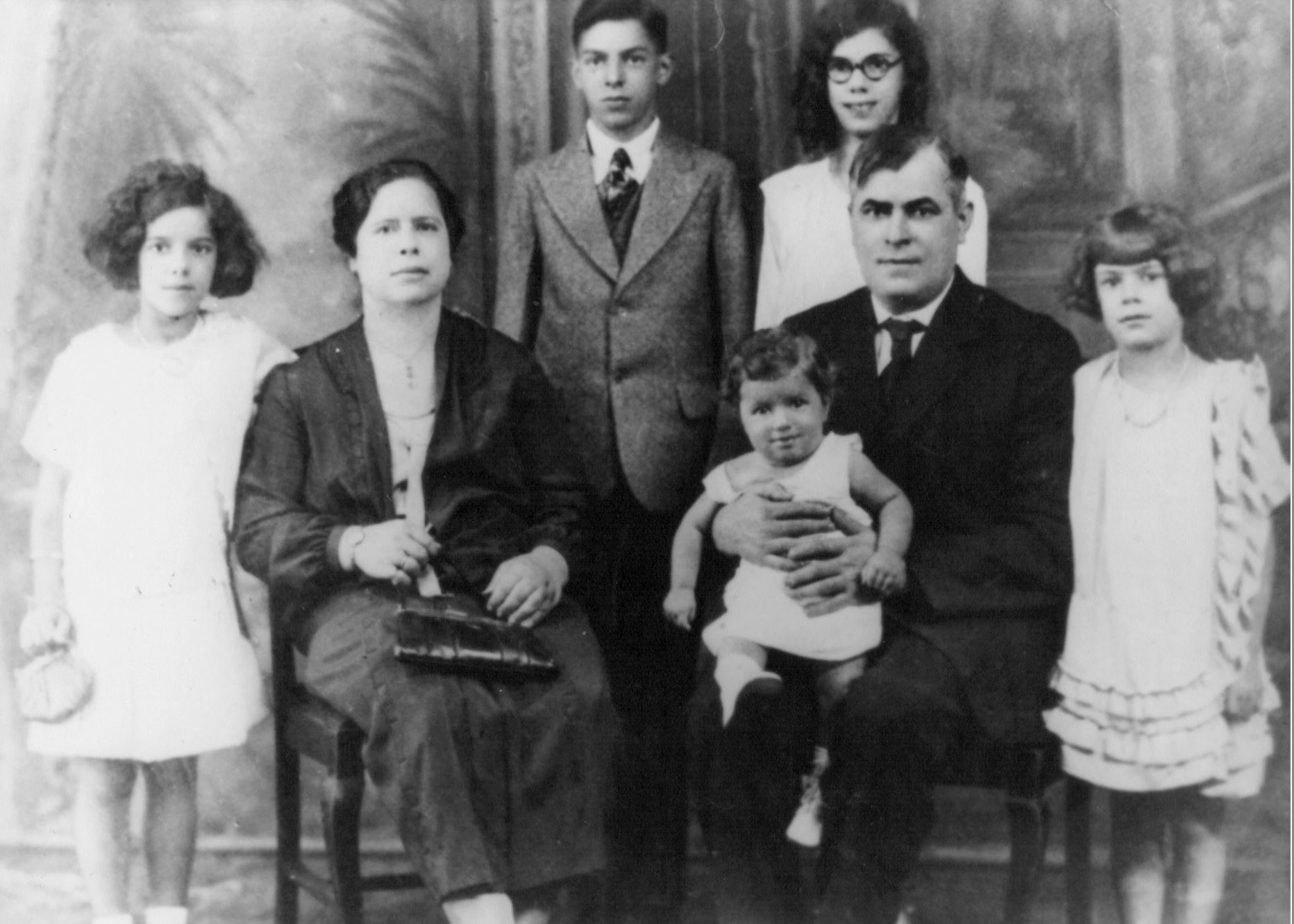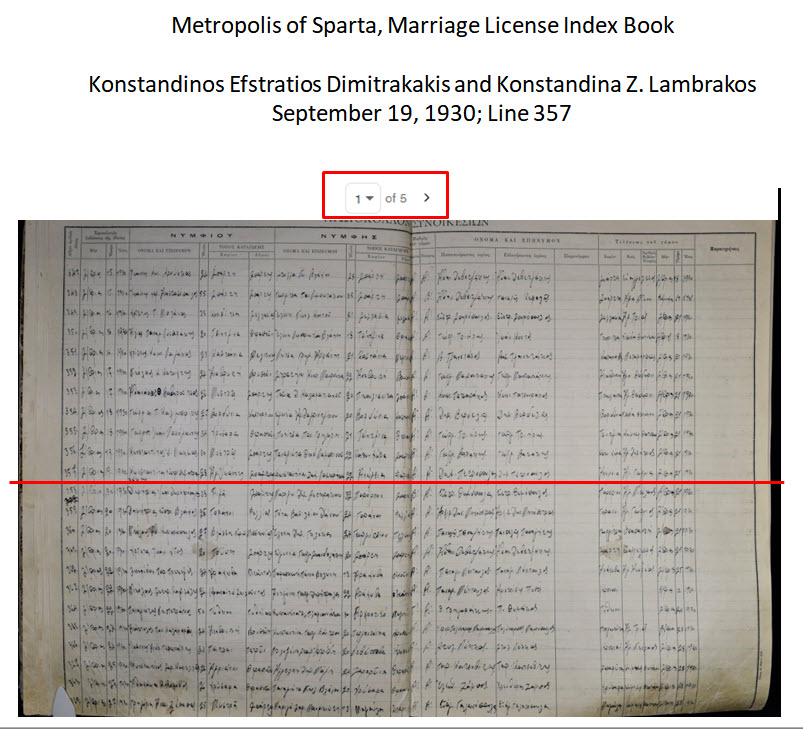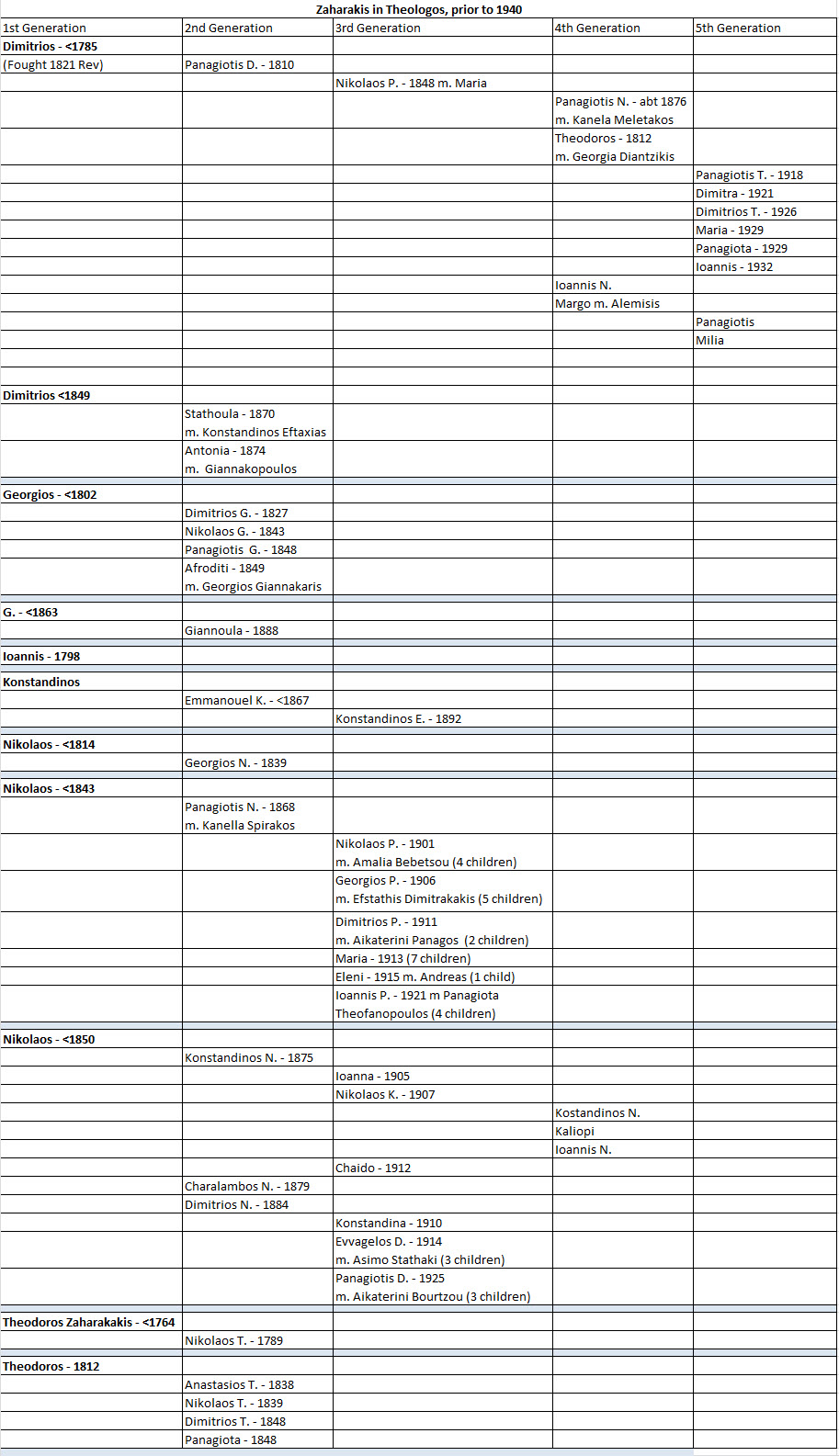How many years does one search to find a record–any record–that proves the existence of a great-grandfather? At what point does a “reasonable” researcher give up?
As a researcher (the reasonable part is questionable) and an eternal optimist, my answer is: never! Never, never, never give up. Newly found and newly digitized records are becoming available continuously; social media is bringing together people who collaborate and help each other; DNA is expanding the “cousin” pool.
All of these stars aligned in the sky to bring forth documentation for my great-grandfather, Andreas Kostakos.
Andreas, I have now learned, was born in 1809 in Agios Ioannis (St. Johns), Sparta, Laconia, Greece. Andreas had two wives, Anastasia–by which he had perhaps six sons, only one of whose descendants we know; and Poletimi Christakos–by which he had five additional children including my grandfather, Ioannis (John). This is the only family photo of my grandfather, Ioannis with my grandmother, Hariklia Aridas Kostakos and their children. My father, Andrew, was the oldest.

Family of Ioannis Andreas Kostakos, about 1930, Brooklyn, New York. l-r standing: Frieda, Andrew (my father), Pauline, Georgia. Seated: Hariklia, Alice, Ioannis.
For years, I have looked for records for Andreas in Agios Ioannis and surrounding villages of Sparta. I sent letters to the Archives in Sparta (excellent support but no Andreas Kostakos found) and the Mayor’s office (no response). Three years ago, my friend and research companion, Gregory Kontos, introduced me to the Election Registers online at the Digital Collection of the Greek Archives. These Registers were created in every village to record the names of men who were at least 21 years old and eligible to vote. The Registers from 1872 are typewritten and easy to read. The older ones, which can date back to 1844, are handwritten and almost indecipherable to a non-native reader.
That collection was my first initiation into trying to read old Greek handwriting. This is not for the faint-hearted, but it is possible. Over the years, I have learned to read some modern Greek writing but the older script is downright intimidating. I never went back to look at the Ladas collection. Until yesterday.
My friend and historian/researcher, Giannis Michalakakos, was working on a genealogy case for a client whose roots were from a village near Sparta. While reviewing the Lada Election Lists for 1844, he saw an entry that he knew was my family. Imagine my shock – joy – disbelief when he called and said that he found the name “Kostakos, And” in Agios Ioannis! My hands were actually trembling when I clicked on this link that took me to the page for file 22, image 99, line 1205: http://arxeiomnimon.gak.gr/browse/resource.html?tab=tab02&id=13499&start=80

General Archives of Greece, Election Material from the Collection of Lada (1844), File 22 – village of Agios Ioannis. File 22, Image 99; Line 1205, Year of Record: 1844, Last name: Kostakos; First name: And.; Male; Age 35; How long lived in the village/resident: αυτόχθων aftochon (indigenous) is from Agios Ioannis; Has money or property? Yes; Occupation: landowner.
On line 1205 is the entry for “And. Kostakos,” age 35:

File 22, Image 99, Line 1205
Giannis and I agreed that “And” was the abbreviation for “Andrew.” His age is listed as 35 in 1844, which puts his birth year at 1809–within two years of a “guess-timate” I had calculated years ago. The 6th column records the length of time the individual was a resident of the village. Andreas is listed as being αυτόχθοω (aftochon) which means “indigenous.” Giannis explained that Andreas, as indigenous, was in Agios Ioannis from the beginning of the existence of the state, i.e., since Greece became an independent nation after the Revolution of 1821.
During my trip to Sparta in 2014, Gregory and I had visited the Greek Orthodox Church Mitropolis of Sparta to research in marriage records. Amazingly, we found, in the Index Book of Marriages, the entry for Andreas and Poletimi who were married on August 20, 1860. This was the first “official” document that proved Andreas actually existed. Unfortunately, it did not give the ages of the couple; thus, the newly-found Election Register has provided definitive information on Andreas’ birth year and birth place.

Mitropolis of Sparta, Index of Marriages, Number 125, Date: August 20, 1860; Andreas Kostakos of Agios Ioannis and Poletimi, daughter of Nikolaos Christakos of Xirokambi, Faridos.
But this new record raises a new research challenge: years ago, my elderly aunt, a descendant of Andreas and Anastasia, told me that Andreas came to the Sparta region from “Pyrgos over the mountains” after the 1821 Revolution to find work (see prior post). That comment had shifted my research focus from Laconia to Messinia, the location of Pyrgos Lefktro–a village which is literally over the Taygetos mountains. My hunt so far has not yielded a Kostakos family; yet, even if I find one I cannot know if the Kostakos is related to me. Kostakos is a patronymic name (Kost-akos literally means son of Kostas); many surnames evolved from patronymics; and there are untold numbers of men named Kostas/Konstandinos in the southern Peloponnese. I hope that DNA will be the next link to connect me with “lost” branches of my family.
Research results? Many years, many efforts.
Without the help of Giannis and Gregory, my research would remain stalled.
Without the digitization of the Election Lists, my research would remain stalled.
Without social media and DNA connections, my research would remain stalled.
Whenever I become frustrated in this quest, I take a step back and look at the totality of the situation: there was no “Greece” during 400 years of Turkish occupation; in the late 1800’s, a new government was being created; life was predominantly rural; people were largely illiterate; recordkeeping was, at best, rudimentary. In retrospect, it is quite amazing that any records have survived. It is encouraging that some have been digitized and are now online.
I continue to have faith that, if there is a written document to prove the existence of of one of my ancestors, at some point in time–with the help of a friend, with the discovery of a new record collection, through a DNA connection–it will find its way to me.






















